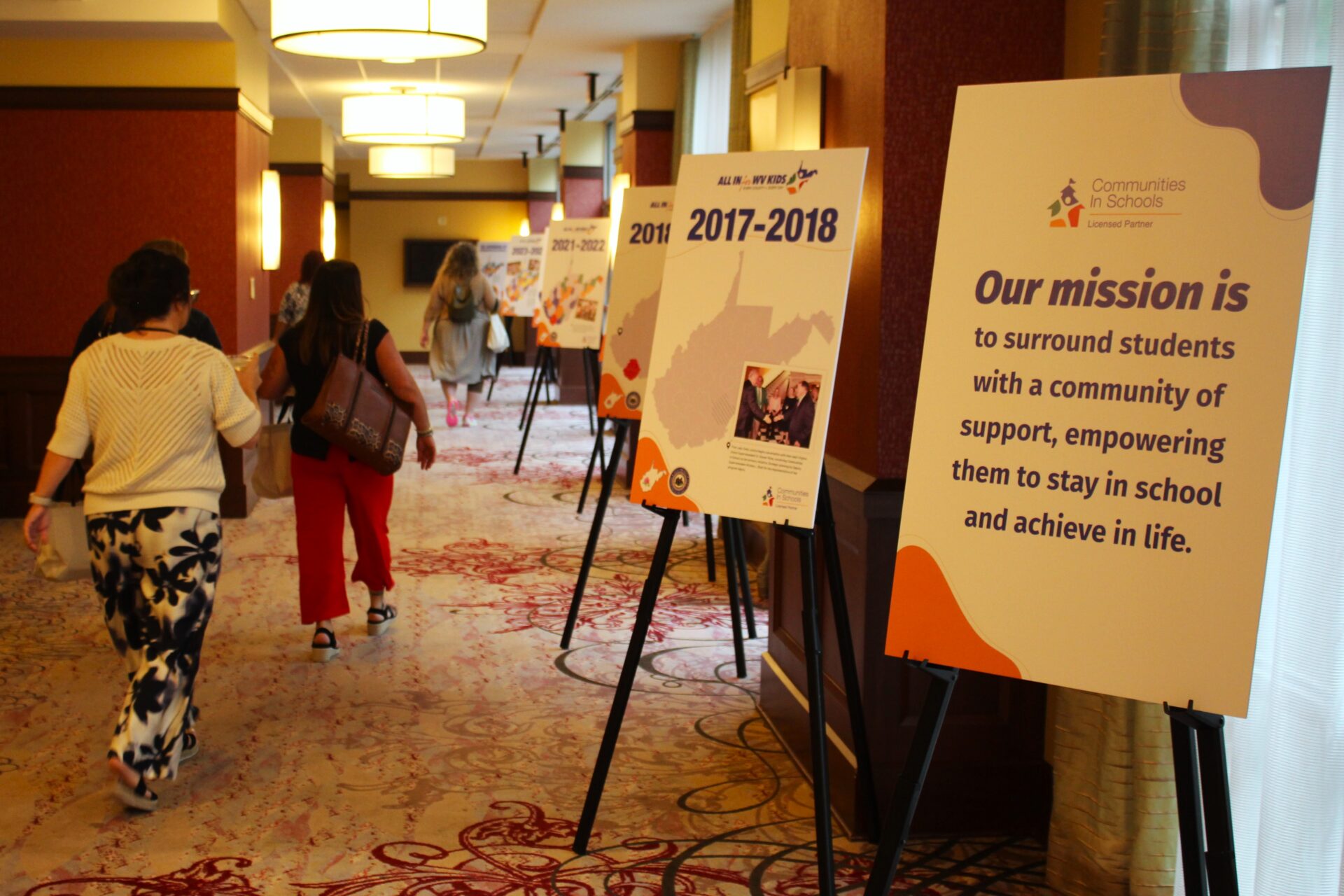Coordinators for an innovative school support program are meeting in Morgantown this week to learn how best to help their most vulnerable students.
Patrick Patton is the Communities in Schools contact for Berkeley County Schools. He handles the administrative side of the program and supports school-based coordinators so they can focus on forming relationships with students and addressing their needs.
“If I don’t know where I’m going to sleep that night, or if I’m going to go to bed hungry it’s hard, a lot harder to study, you can’t pay attention in school,” Patton said. “We might act out. And if we act out in school, there’s consequences. With Communities in Schools, building on relationships, what the site coordinator does is get to know those students, get to know those families, and works tirelessly and very many instances creatively, to address any burden that could get in the way of not only that student, but that family succeeding in school.”
Communities in Schools is a national program designed to connect struggling students to caring adults and community resources such as mental health services or clothing. Berkeley County was one of the first counties in the state to take part in the Communities In Schools pilot program.
Now active in all 55 West Virginia counties, the annual Student Supports Institute of The Communities In Schools (CIS) West Virginia Program is being held in Morgantown this week.
Patton came to the conference to see what other counties are doing and ensure his district is doing the best for their students.
“It’s easy to do, I think, to continue doing what you do, but by getting exposure to other districts, other counties, they might have new ideas that we can bring back to Berkeley County,” he said. “New fresh ideas, creative things that we haven’t thought of. So that’s the benefit of really getting us all together in person, not just virtually.”
In December West Virginia became the first state department of education to receive national certification as a licensed CIS partner.
First Lady Cathy Justice has made CIS her primary initiative since 2018. She helped start the conference, and praised the program’s site coordinators for their creative problem solving and commitment to students.
“You all make this program go. If it weren’t for you all, and your caring, it wouldn’t be what it is today,” Justice said “Everyone in this room, you have washed clothes at school, you have gotten a child out of class who doesn’t feel well. You have collected food on Fridays to put in backpacks for them to take home so they’ll have food to eat over the weekends. People don’t know that’s what you do, but you care. And these children in the schools, they know where you are in the schools, they know where to come and talk to you. And y’all have such a rapport with the children, that they come and tell you their needs or what’s wrong with them.These children in the schools, they know where you are in the schools, they know where to come and talk to you. And you all find a solution to their problem.”
Chris Schulz/West Virginia Public Broadcasting
The First Lady was joined by Gov. Jim Justice, as well as BabyDog, who acted as an ambassador for Friends With Paws, a spinoff of Communities in Schools that brings therapy dogs into classrooms to help students.
The governor extolled the importance of CIS – but also said that as he prepares to leave office, the program’s future is uncertain.
“This is a home run of homeruns of home runs of home runs. You got to keep it going,” Justice said. “I’m not gonna be your governor forever. Cathy’s not gonna be your first lady forever. In fact, it’s very, very short lived. You’ve got to make sure that your legislators absolutely believe just as much as I believe, or Cathy believes. Because this is the real deal.”
Justice pointed not only to the effects the program has on individual students, but its broader-reaching implications for the communities it serves.
“You know, when you change that life, and you put them on the right path by just doing the smallest of things, but you’re there for them, you’re there for them. Absolutely,” Justice said. “When you do that, not only do you change that life and make things so much better, but you’re doing something that affects all the other kids in the class. You’re doing stuff that affects all the things about the school, the community and on and on. You should be really proud.”
According to the West Virginia Department of Education, CIS supports 272 schools and 114,000 students through the work of 243 site coordinators, like Nadia Johnson.
“I’m from McDowell County, graduated from the high school I’m working at and exactly what our mission statement says, ‘Support students in every aspect of their life to achieve,’” she said. “Whether they go into a job, whether they’re going to school, we’re just going to provide them with a community of support to help them achieve.”
Johnson is the site coordinator at Mount View High School in McDowell County. She says the community covers students’ food needs well, so clothing and hygiene needs are a focus of her work.
“I’m just looking forward to networking with other counties to better see how I can serve my students,” Johnson said. “It’s always important just to get out here and figure out what I can do differently, what I can do better, and how I can branch out to just offer more services because my kids deserve the world.”
According to national CIS data, among the case-managed students the program has served, 76 percent experienced improvements in their behavior, 82 percent had improvements in academics and more than 99 percent remained in school.
